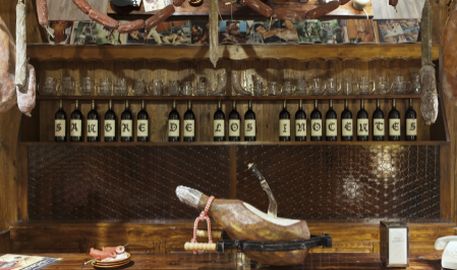Welcome To The Hotel Munber (installation): Difference between revisions
Jackie Sider (talk | contribs) No edit summary |
Jackie Sider (talk | contribs) No edit summary |
||
| (3 intermediate revisions by the same user not shown) | |||
| Line 7: | Line 7: | ||
====Medium: [[:Architectural Installation| Architectural Installation]]==== | ====Medium: [[:Architectural Installation| Architectural Installation]]==== | ||
---- | ---- | ||
[[File:Hotel_munber.jpeg|right]] | |||
'''Artist:''' Simon Fujiawara | '''Artist:''' Simon Fujiawara | ||
'''Confronting Bodies:''' | '''Confronting Bodies:''' Museum staff of Singapore Biennale venue | ||
'''Dates of Action:''' March 2011 | '''Dates of Action:''' March 2011 | ||
'''Location:''' Singapore | '''Location:''' Singapore | ||
'''Description of Artwork:''' | '''Description of Artwork:''' Fujiwara's architectural installation is intended to resemble a hotel bar during Franco-era Spain. Originally, he planned to write an erotic novel featuring his parents (who owned a hotel during this period), with his father as the homosexual protagonist. Instead, Fujiwara -- known for incorporating architecture, performance art, and storytelling into his works -- used that concept to create an imitation of the bar in the hotel his parents owned, with sexual objects hidden around the room. Gay pornography, castanets arranged to resemble testicles, and wine barrels with fake fingers pointing out of them adorn the "bar." | ||
'''The Incident:''' | '''The Incident:''' First, a sign warning museum visitors of the installation's "sexual nature" was hung up before the entrance to Fujiwara's exhibit area. Then, without asking or consulting with Fujiwara, the museum staff removed all of the erotica featured in the work. Without these pieces, the piece has been rendered "meaningless, almost a tribute to Franco in the end," as the artist put it. Although Singapore is thought to be one of the most progressive countries in Asia, this incident suggests that there is still resistance to free expression. The erotic objects were left in the exhibit for the first two weeks of the biennale, so that "journalists were thus given a view of a wonderfully liberal Singaporean arts scene, whereas us Singaporean viewers had that old, familiar conservative nanny-state treatment." | ||
'''Results of Incident:''' | '''Results of Incident:''' This piece, along with other works, have been displayed in their original incarnations in other museums worldwide, including the Tate Museum in London, England and the Museum of Contemporary Art in Tokyo, Japan. | ||
'''Source:''' | '''Source:''' [http://www.fridae.asia/newsfeatures/2011/03/25/10744.simon-fujiwara-censored-at-the-singapore-biennale-2011 Fridae article] | ||
Latest revision as of 19:50, 2 March 2012
Date: 2011
Region: Asia
Subject: Explicit Sexuality
Medium: Architectural Installation
Artist: Simon Fujiawara
Confronting Bodies: Museum staff of Singapore Biennale venue
Dates of Action: March 2011
Location: Singapore
Description of Artwork: Fujiwara's architectural installation is intended to resemble a hotel bar during Franco-era Spain. Originally, he planned to write an erotic novel featuring his parents (who owned a hotel during this period), with his father as the homosexual protagonist. Instead, Fujiwara -- known for incorporating architecture, performance art, and storytelling into his works -- used that concept to create an imitation of the bar in the hotel his parents owned, with sexual objects hidden around the room. Gay pornography, castanets arranged to resemble testicles, and wine barrels with fake fingers pointing out of them adorn the "bar."
The Incident: First, a sign warning museum visitors of the installation's "sexual nature" was hung up before the entrance to Fujiwara's exhibit area. Then, without asking or consulting with Fujiwara, the museum staff removed all of the erotica featured in the work. Without these pieces, the piece has been rendered "meaningless, almost a tribute to Franco in the end," as the artist put it. Although Singapore is thought to be one of the most progressive countries in Asia, this incident suggests that there is still resistance to free expression. The erotic objects were left in the exhibit for the first two weeks of the biennale, so that "journalists were thus given a view of a wonderfully liberal Singaporean arts scene, whereas us Singaporean viewers had that old, familiar conservative nanny-state treatment."
Results of Incident: This piece, along with other works, have been displayed in their original incarnations in other museums worldwide, including the Tate Museum in London, England and the Museum of Contemporary Art in Tokyo, Japan.
Source: Fridae article
